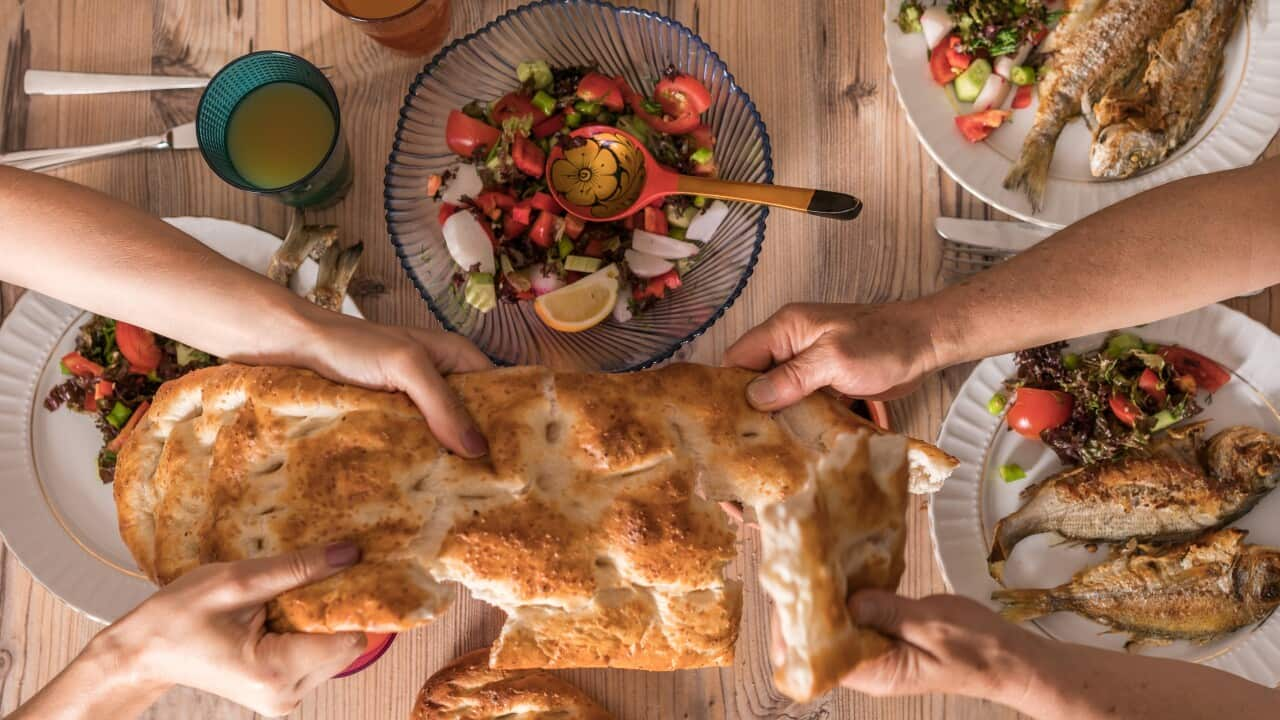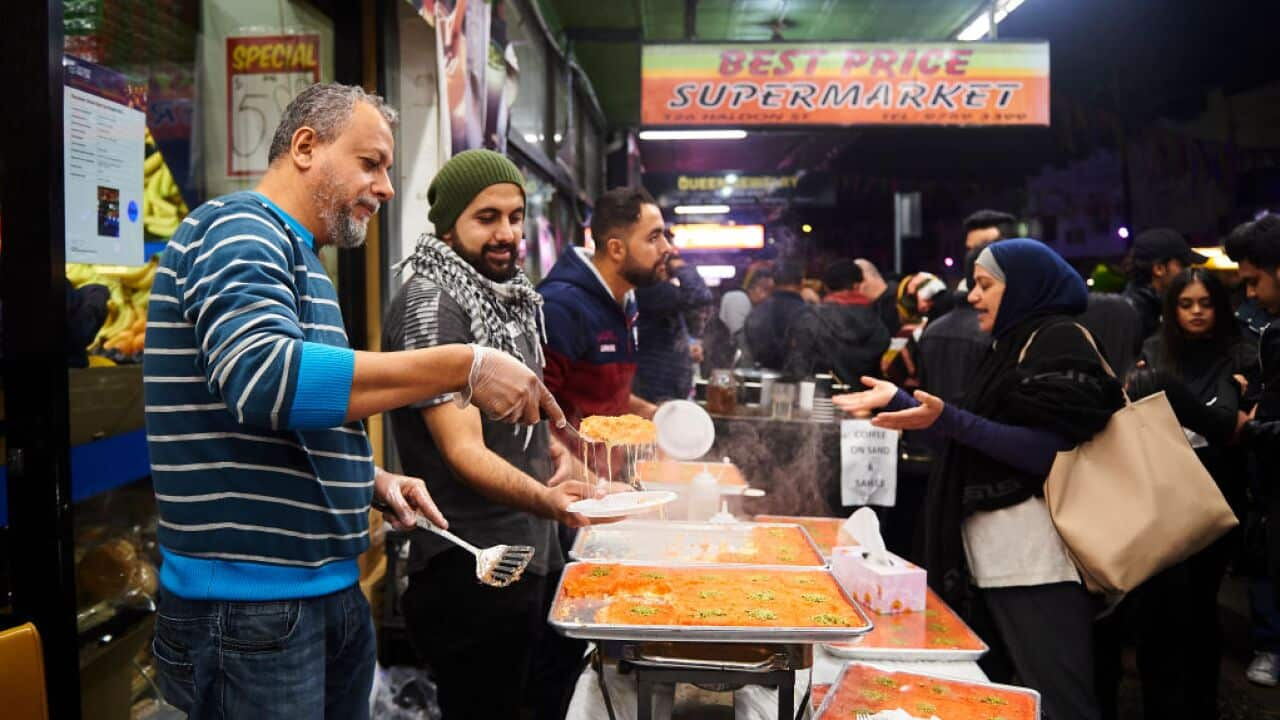Highlights
- Research has shown that fasting can assist with cell regeneration and longevity.
- In many religions and philosophies, either intermittent fasting or calorie reduction has been practiced for centuries.
- Children, the elderly and people with eating disorders should not fast.
When living in a multicultural country such as Australia, you will most likely meet or make friends with people who practice a different faith or culture.
It's important to be able to understand and appreciate the religious and cultural attributes of Culturally and Linguistically Diverse (CALD) communities, which leads to a more cohesive society.
One of these practices is religious fasting observed by many different faiths.
Diana Abdel-Rahman, OAM, every year presents a radio program about Ramadan on Australian Muslim Voice Radio (AMV Radio), of which she's also the president.
AMV Radio is an English language radio program broadcasting 24 hours a day during Ramadan in Canberra.
Ms Abdel-Rahman says Ramadan is a time for Muslims to reconnect with God and with their religion.
"Fasting actually benefits the body, mind, and soul. During the month of Ramadan you often increase your prayers. It's a chance where everybody gets to reconnect with God," Ms Abdel-Rahman said.
"It's a chance where we get to drop everything else that we're doing and completely focus on our faith".
Ramadan is the Arabic name for the ninth month in the Islamic calendar. During this month, which can last 29 or 30 days, depending on the lunar calendar, Muslims do not eat nor drink — not even water — from sunrise to sunset.

Fasting is one of the Five Pillars of Islam. Source: Pexels/Monstera
Intermittent fasting
Ramadan is a form of intermittent fasting (IR), which is a term used to describe a variety of eating patterns in which no or few calories are consumed for time periods that can range from 12 hours to several days, on a recurring basis.
Dr Veronique Chachay, an Accredited Practising Dietitian a Lecturer and Research academic at the University of Queensland, says more specifically, Ramadan falls in the category of time-restricted feeding — which is a type of intermittent fasting.
Dr Chachay says abstaining from food entirely for limited periods of time brings some key benefits to the body.
"During a window of fasting, you are triggering — the mechanism at a molecular level is triggering — the resilience mechanisms in the cell. So the cell switches into a stress response and that mild stressor — here we say mild because it's not for too long — will activate certain genes that are known to code for enzymes for detoxification," she explained.

Source: Getty Images/lacaosa
As a result, the cell is doing a bit of spring cleaning.
Abstaining from water has not been proven to have any benefits. Drinking water would actually be beneficial to flush the toxins, Dr Chachay says.
When people are fasting, a process called “autophagy” is induced in a wide variety of tissues and organs, Dr Chachay explains.
"[The cell] is recycling what it can. So old organelles — which are those particles within the cells which are old — are being recycled. So it’s recycling what it can keep — so, maybe amino-acids that can be recycled — so it's promoting what we call a principle of 'autophagy': 'auto' (self) and 'phagy' (eating) so 'eating itself'”.
This can improve overall health and delay ageing, Dr Chachay says.
"These mechanisms are associated with better outcomes over time because you're reducing cellular waste, you’re reducing toxins".
You're increasing the ability of detoxifying. So the end result is kind of a regenerating process.
Dr Chachay says when people break the fast, they again contribute to the regeneration process of the cells.
"When the person starts feeding again, then that switching from the fasting to the feeding in itself is also a beneficial effect because the cell has been deprived or certain nutrients, and then suddenly these nutrients come in and it's making the maximum of these nutrients.
"It's not being wasted. It's not in surplus. It's being used for the optimal function of the cells," she said.
However, when one starts eating again, it’s important to eat good food, and not over-consume sugary or fatty foods, says Dr Chachay, especially is the fast is broken in the evening.
"High insulin at night-time is not associated with good health outcomes," said Dr Chachay.
In Judaism, like in Islam, fasting is intended as completely abstaining from food and drinking — including water.
The practice of fasting is a major part of Hinduism too, and it can range from light restriction to extreme abstention. In the Hindu religion however, fasting is not an obligation, but a moral and spiritual act where the aim is to purify the body and mind.

Breaking fast in Ramadan. Source: Getty Images/Jasmin Merdan
Calorie restriction
Some religions fasting consists of abstaining from certain types of food during certain periods.
For example, Catholics do not eat meat on Fridays during Lent, and Greek Orthodox Christians abstain from mostly dairy products, eggs, and meat, and sometimes olive oil and fish, for a total of 180-200 days each year during three periods.
Dr Chachay says this type of fast fits in the category of calorie restriction (CR).
A modern diet based on this principle is the CRON-diet — calorie restriction practice on optimal nutrition— which involves calorie restriction in the attempt to improve health and retard ageing, while still attempting to provide the recommended daily amounts of various nutrients. Dr Chachay says the idea here is to put the body into a mild stress, that means the body learns to do the most of what he has — or of what it is receiving.
Dr Chachay says the idea here is to put the body into a mild stress, that means the body learns to do the most of what he has — or of what it is receiving.

Source: Pexels/Nicole Michalou
"Obviously all the conditions that are associated with excess fatty tissue in the body — like mild inflammation — which are all precursors of chronic disease, do not take place," she said.
"And because those genes are stimulated a bit less than when you're fasting completely, but are still a little bit stimulated — the idea is a better antioxidant defense, so that means the ability of the body to really clean up free radicals, toxins, and so on."
The overall effect out of that is that it will slow down the ageing process.
Modern diets
Popularised versions of intermittent fasts include the 5:2 diet, which involves eating no more than 500 calories in a day, twice a week.
Its author, Dr Michael Mosley, has more recently updated the plan with the Fast 800, which prescribes 800 calories for two days and a lower carb diet on the remaining five.
Another scientifically backed plan is the Fasting Mimicking diet formulated by Dr Valter Longo.
Dr Chachay says this kind of fast can help reset the hormones, and also promote cell renewal.
"What the Longo group demonstrated is that you don't need to go to zero calorie to have the benefits of fasting, even just dropping at least half what you would do normally you are still inducing the benefits," Dr Chachay explains.
On the Fasting Mimicking diet there's also a drop in the percentage of protein being consumed.
"This protocol is recommended to be done once two, three times per year — for five days — for the purpose of basically resetting those hormones, that it shouldn't be at high level, but also to promote the autophagy, the cell renewal, the upregulation of antioxidant enzymes".

Children should not fast. Source: Pixabay/Jill Wellington
Fasting is not for everyone
Dr Chachay says fasting isn’t recommended for people who are underweight, or have a pre-existing medical condition, as well as people who have an eating disorder.
Adama Konda is the Imam at the Canberra Islamic Centre.
He says children, the elderly, and sick people are not expected to fast during Ramadan.
"A child does not need to fast because they need to eat... a traveller doesn’t have to fast, as he [or she] can make up for it later at home. Also elderly people, they don’t have to fast either. When women are pregnant or breastfeeding, they don't have to [fast]," Mr Konda said.
If you are physically not able to do it, you are not allowed to do it.
Dr Chachay stresses the importance of having a balance diet and recommends speaking with a GP or a healthcare professional before starting a new dietary regime.




